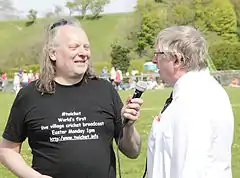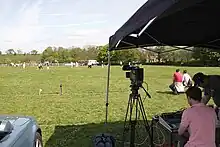Twicket
Twicket (a portmanteau of Twitter and Cricket) was a village cricket match, streamed world-wide on the Internet on Easter Monday, 25 April 2011,[1] with the intention of highlighting the need for high-capacity upstream broadband to enable community content provision.[2] This innovative exercise—claimed to be a world first[1]—caught media attention, making BBC television news, BBC Radio London,[3] TalkSport,[4] Radio New Zealand;[5] and being written about by The Guardian,[2][6] The Observer[7] and Metro[8] and mentioned on Twitter by Stephen Fry,[9] the BBC's Rory Cellan-Jones[10] and Jonathan Agnew (BBC cricket correspondent).[11]
 John Popham interviews the umpire, John Marshall. | |
| Date | 25 April 2011 |
|---|---|
| Location | Wray, Lancashire, England |
| Coordinates | 54.10319°N 2.60761°W |
| Also known as | Wray vs. the Rest of the World |
| Filmed by | Aquila TV |
| Outcome | Wray beat Rest of World |
| Website | www |
Background
The event was conceived by consultant John Popham after seeing two comments on Twitter;[1] in the first Dan Slee expressed his hopes for keeping up with a local village cricket team via Twitter.[1][12] Then, Chris Conder (@cyberdoyle) mentioned that she was testing a new 30 Mbps, symmetrical internet connection,[13] recently installed by Lancaster University[14] in her village, Wray, in Lancashire, England,[1] one of only three villages in the UK to have a symmetrical community network.[2]
On learning from Conder that Wray was to hold a special cricket match part of the village's annual Scarecrow Festival,[1] billed as Wray vs. the Rest of the World,[15] Popham decided to broadcast it to the world to demonstrate the potential of high-speed synchronous broadband.[1] He explained:[6]
I'm confident we can do this, because the village Wi-Fi has a 30Mbit/s upload speed ... It's a bit of fun, but it has a serious purpose too. The serious side is to demonstrate that it can be done, it is possible to live broadcast events like this using relatively cheap equipment and a good internet connection. It will also demonstrate the importance of good internet connectivity in rural areas, and the need for fast upload connections if we are to realise the aspiration to use the internet to enable more people to produce their own content.
In a retrospective blog post, he explained:[16]
the point is that putting the cricket match up front made people turn their heads in my direction and I then had a platform from which to make some serious points about countryside connectivity
The match
The match was 20 overs per side (the Twenty20 format), with any batsman reaching 20 runs required to retire. Wray won the toss,[17] and elected to bowl first.[17] After 20 overs, The Rest of the World were 69 for 5,[17] leaving Wray needing 70 runs off 20 overs, which they achieved with a final six, in their eleventh over,[17] winning by 8 wickets.[17]
The post-match tug o'war contest (won by Rest of World, 2 out of 3) was also streamed live,[17] as were interviews with various participants.[17]
Media

The event was streamed online on Bambuser with technical support from Birmingham company Aquila TV[2][18] who used two Sony Z1 cameras and a DSR 350.[2] The stream was watched by a peak of 2,733 viewers. A separate audio commentary was broadcast on-line, by Radio Youthology,[2] attracting 1,780 listeners; their highest figure ever.
Also attending were a BBC North West television news crew,[17] whose film was broadcast the same evening.[19]
The related hashtag #twicket was trending on Twitter shortly before the end of the match.[2] The match also made a star out of local commenter, Brenda, who drank Pimm's throughout the game.[2]
References
- Popham, John. "A World First – Live Broadcasting a Village Cricket Match". Retrieved 17 April 2011.
- Hartley, Sarah (25 April 2011). "Lancashire village cricket match attracts thousands..." The Guardian. London. Retrieved 25 April 2011.
- "BBC Radio London". 26 April 2011.
- "TalkSport". 26 April 2011.
- "Radio New Zealand". 6 May 2011.
- Hartley, Sarah (12 April 2011). "Cricket livestream to highlight rural broadband needs". The Guardian. London. Retrieved 17 April 2011.
- Krotoski, Aleks (15 May 2011). "Being British: How has the internet affected our national identity?". London: The Observer. Retrieved 15 May 2011.
- Metro, 15 April 2011
- Stephen Fry [@stephenfry] (12 April 2011). "A World First? Live Broadcast of a Village Cricket Match johnpopham.wordpress.com/2011/04/10/a-world-first-live-broadcasting-a-village-cricket-match/" (Tweet) – via Twitter.
- Rory Cellan-Jones [@ruskin147] (25 April 2011). "A live village cricket match on Twitter - you can watch here: bambuser.com/channel/johnpopham/broadcast/1605441 #twicket" (Tweet) – via Twitter.
- Jonathan Agnew [@Aggerscricket] (22 April 2011). "RT @Pam_nAshes Have you heard about the Village cricket match being streamed live on the web on Monday? bit.ly/i5pA1V "Sounds fun"" (Tweet) – via Twitter.
- @danslee (10 April 2011). "Love the idea of getting a glimpse of village #cricket this summer via Twitter. Here's @StoneSPCC. yfrog.com/h3s1owoj #staffordshire" (Tweet) – via Twitter.
- @cyberdoyle (10 April 2011). "our community wifi network giving us 30 meg symmetrical today #digitalbritain tinyurl.com/3kcb4tj #fiwipie" (Tweet) – via Twitter.
- "RuralConnect Living Labs". Retrieved 17 April 2011.
- "Wray scarecrow village UK information page". Archived from the original on 30 April 2011. Retrieved 17 April 2011.
- Popham, John (10 May 2011). "#twicket, community, and social capital". Our Society. Retrieved 30 September 2020.
- "Twicket (video stream archive)". 25 April 2011. Retrieved 25 April 2011.
- "Aquila TV". Retrieved 26 April 2011.
- "BBC iPlayer – North West Tonight: 25/04/2011". BBC Online. BBC. 25 April 2011. Retrieved 25 April 2011.
External links
- Official website

- Highlights on YouTube
- The Story of #Twicket – Popham's post-event round-up.
- Popham interview on BBC Radio Lancaster
- BBC North West news feature, extracted to Vimeo